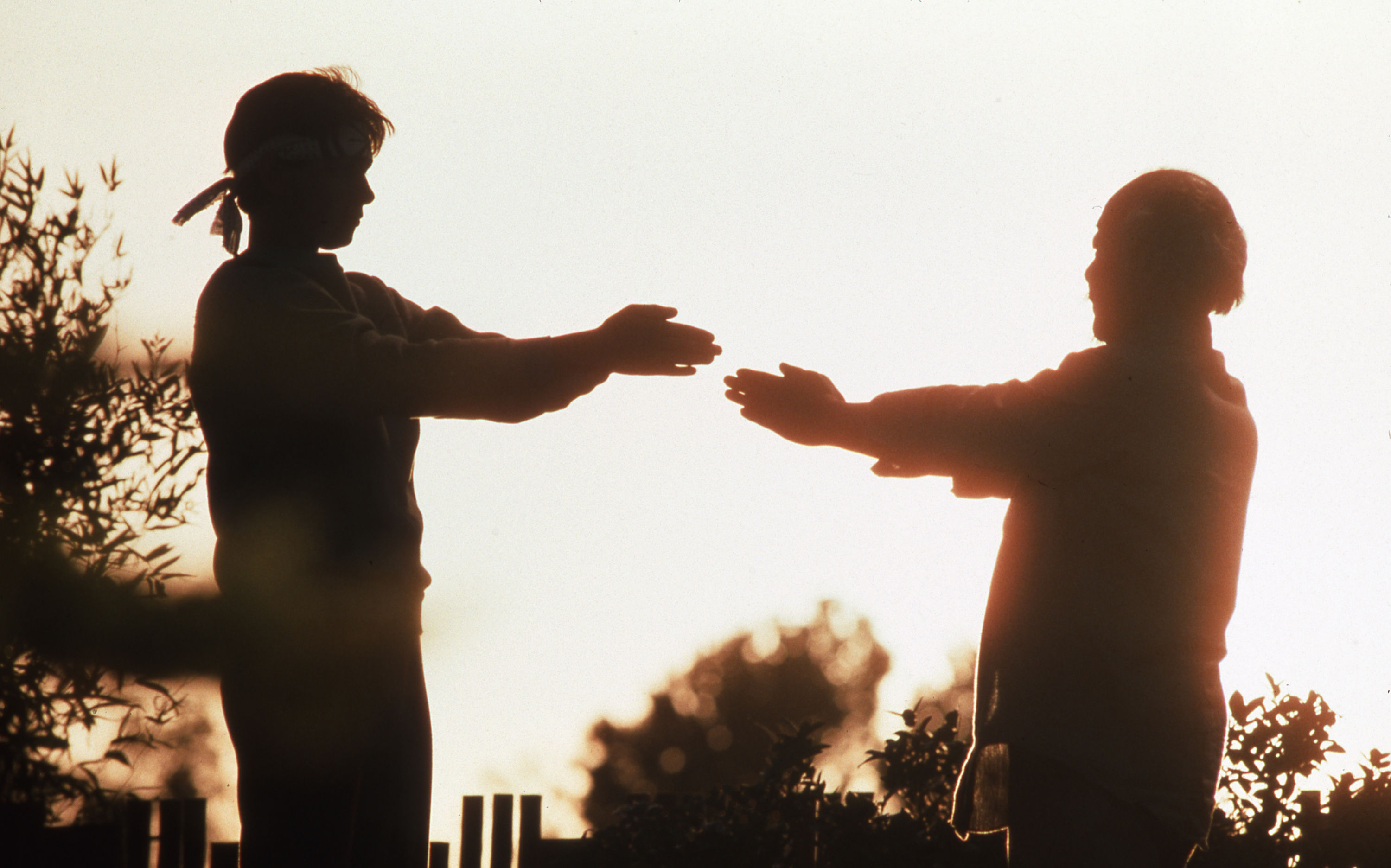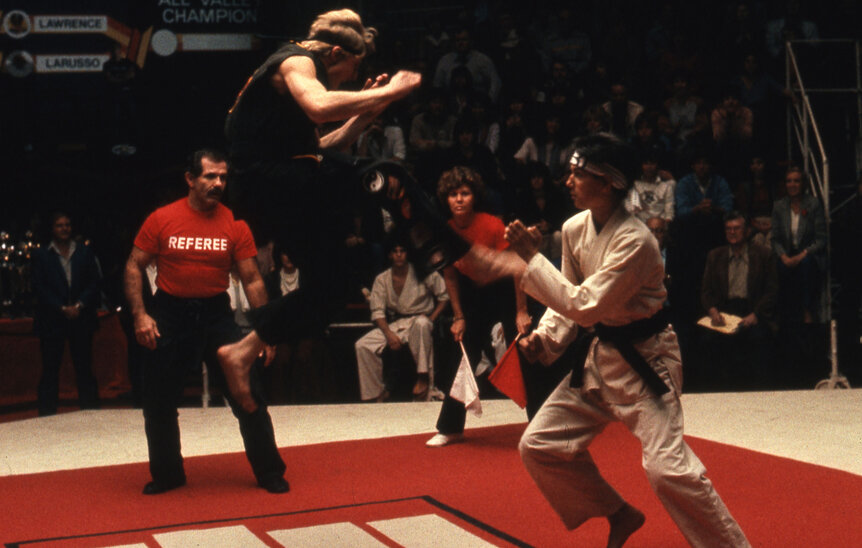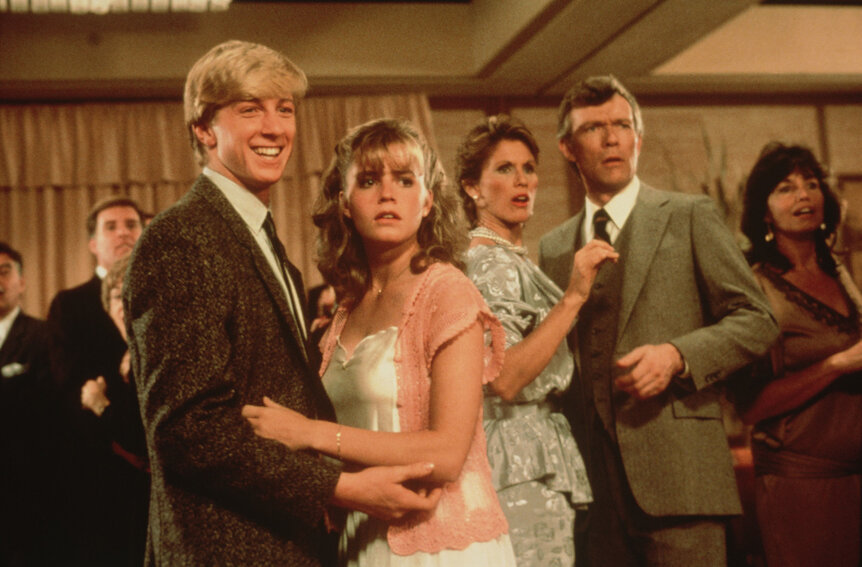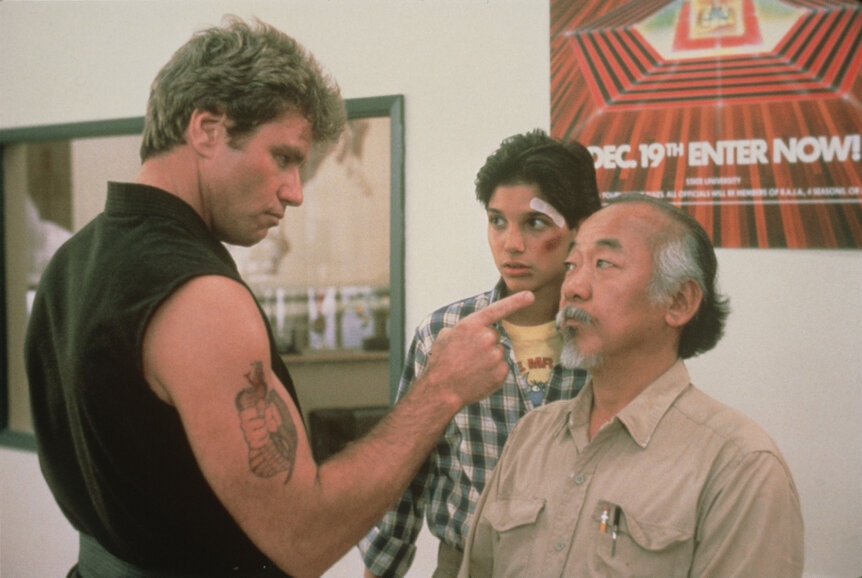Create a free profile to get unlimited access to exclusive videos, sweepstakes, and more!
Kicking it with Ralph Macchio, William Zabka, and Martin Kove on The Karate Kid's 35th anniversary

For folks of a certain age, the stars of The Karate Kid, and by extension, Cobra Kai, feel like people you grew up with. Ralph Macchio (Daniel LaRusso) is like your best friend from middle school. William Zabka (Johnny Lawrence) is the bully who stole your juice boxes. And, at any moment while talking to Martin Kove (John Kreese), you half expect him to make you go run laps around the soccer field, like your evil gym teacher of yore.
Of course, if you're a Karate Kid fan, this is just a natural reaction to characters so perfectly portrayed as to be indelibly etched in your psyche. Yet, as SYFY WIRE found out via three separate phone calls, the men who play those parts are perfectly lovely and candid individuals, who appreciate the magnitude of those roles, and their place in the pantheon of pop culture. That's their lot now — the hero, the bully, the villain — and they couldn't be happier about it.
"The characters were fun to play, and I never looked at it like, 'Oh, I'm gonna be the bad guy. Oh no, I'm the bad guy,'" Zabka says while promoting The Karate Kid's two-night rerelease next week, in celebration of the film's 35th anniversary. "I think it was just that after time went on, that kind of '80s genre of villain and style, in hindsight kind of got crystalized, and I was in that bubble. I just embraced all of it."
YouTube's Cobra Kai punctured that bubble by showing a different side of Johnny Lawrence, and the upcoming second season will add some depth to John Kreese, one of the most reviled villains in film. Still, it's because of Rocky director John G. Avildsen's original 1984 underdog film that modern fans are so invested in The Karate Kid saga. That, and a case of perfect timing.
"It was the right people at the right time telling a story that worked on a human level that connected with so many of the adolescents in us at heart, because LaRusso is that every-kid next door that had no real business winning anything, and we could all see ourselves in him, we've all had that moment where we felt like the outsider," explains Macchio, making a sly reference to his own role in 1983's The Outsiders.
"We've all felt either picked on, bullied, and/or we are a child of a single-parent home, or we've been someone who's moved to a new town and didn't fit in at the onset," Macchio continues. "There are so many elements that are just part of coming of age and just human connection. And then the wish fulfillment of, 'God, wouldn't it be wonderful if we all had a little human Yoda with us that could be there and help us navigate this part of our lives?'"
Macchio is, of course, referring to Pat Morita, who earned an Oscar nomination for the role of Mr. Miyagi, Daniel's adopted karate instructor, the softer, gentler sensei of the film, and the foil to Kove's no-mercy granting Kreese.
"Working with Pat was sensational, he had such a great sense of humor. And working with John, he was a major visionary. And Robert [Kamen] wrote stuff that we're still saying 35 years later," Kove says about the experience. "This was a movie that was not improvised, this was a movie where everyone had a job to do. [Producer] Jerry Weintraub was on set every day, and it was run not uncomfortably, but it was run like it was a military camp, a creative military camp."
But even with such a collection of talent and leadership, there was never a guarantee it would all work. So at what point did the actors know they'd captured "lightning in a bottle," as Zabka describes it?
For Macchio, there was a "distinct point" that he knew it was going to be big. The audience at a sneak peek in New York City was enthralled by the film," everyone on the street, on Third Avenue, was doing the crane kick" when they exited the theaters, Macchio recalls.
"And Jerry Weintraub, the late-great producer, leaned over to me and put his hand on my shoulder and says, 'Uh, we're gonna be makin' a couple of dese, yeah,'" Macchio continues.
Which, of course, they did, beginning with a scene that was actually supposed to be the final scene in the first Karate Kid, but Weintraub and Avildsen decided to end on the All Valley Karate Championship-winning crane kick, rather than on the one note that Kove felt didn't ring true: When Miyagi pinches Kreese's nose instead of taking his head off.
"In actuality, I didn't like that scene. I kind of thought it was too animated… it was the only moment in all the moments of all three movies that I think was a little over the top," Kove says.
Or, perhaps Kove just didn't like getting shards of glass in his fists after really punching through the car windows, when the special effects guy couldn't get the glass to blow. "That punch, we practiced so much going through the glass over Miyagi's shoulder, the special effects man never broke the glass," Kove says. "Lunge punch, lunge punch, lunge punch, I kept hitting the glass. And finally he said it would work, and when I did it, I blasted right through the glass, and special effects never shattered the glass, and my hand was riddled with shards of glass. It was terrible. And we had to patch me up and then we shot the scene again — and he still didn't blow it."
That wasn't the only time that real blows were thrown; poor Zabka couldn't hide from the wrath of Elizabeth Shue (Ali Mills) at the Encino Oaks Country Club, when Ali socks Johnny for being a big jerk again. "She never didn't connect in the country club scene," Zabka says. "Every time she punched me, she just somehow didn't pull the punch and kept hitting my jaw. In fact, my smile when Daniel was coming in with the spaghetti on him was half laughing at the fact that she just punched me in the face again in real life."
Morita and Macchio apparently had better choreography in their exchanges, particularly in the big payoff scene, where Daniel-san loses his patience with doing Miyagi's household chores.
"If I was ever sitting down in between scenes, [Avildsen] would be like, 'Why aren't you practicing the wax on/wax off scene?' That's what he would say. Well, 'Because I need to sit.' He'd say, 'It can't be fast enough, can't be good enough, can't be quick enough, can't be sharp enough.' And he couldn't be right enough. We worked hard on that being that moment, and Pat and I would always practice it," Macchio says. "More than anything, why is it great? Because it's well written, it's beautifully set up, and it's enormously paid off. And it sits at the place of the movie, just at the point – just like the character – that you're just frustrated with all this, and it comes back around and everybody's been duped and had no idea that that's what it is, and it was magic."
Contributing to the magic was the clear good-versus-evil set up, but Zapka never saw Johnny in that light. "I didn't really see him as a straight-up villain, I saw him with some redemptive qualities," he explains, specifically referring to two anchor points: the moment when Johnny's on his dirt bike riding down to the beach party at the beginning of the film, where he tells his Cobra Kai buddies he has one year to make things work; and when he hands Daniel the trophy at the end. "At his core, I always felt he was a human being, and I think that's part of what's special about the film."
And that's also what's special about Cobra Kai. "The core of Johnny at the beginning of Karate Kid is still who Johnny is today, and that's, 'I've got one year to make it work…' you know, and it's been 35 years and he still hasn't made it work yet," Zabka says.
That moral ambiguity will be played up even more so with Kreese coming back into the fold. "Honestly, the way they've written this guy, is exactly what the politics are out there," Zabka says. "What's happening now is real for John Kreese, and what's happening for you out there now, and Martin Kove, is real for John Kreese, and real for us individually. It's so well structured, that everything is identifiable. And that's what's so good."
"This is a man who's very much like a father figure who gave him his best glory days and his biggest defeat, and now he's stepping back into his life at this time when he's trying to still figure it out. So certainly Kreese is going to complicate things for Johnny's process," Zabka says.
"The Darth Vader of the '80s is what he became. And he's still the essence of that, you'll enjoy it in Cobra Kai, it starts off where it left off," Macchio says. "He throws a wrench in all plans. And you don't quite know what and where his allegiance is, and how it is going to pan out. This whole season, I can promise you because I just viewed it, it goes in a direction and ends in a way you would have never expected, and it's really cool. And Martin does just a terrific job. It's a lot of fun. We have a lot of new characters in there, and rivals, and some kick-ass martial arts and surprises."
Surprises like Elisabeth Shue coming back?
"I can't say anything about anything like that!" Macchio says. "But I can say this much: anything is possible that works organically in the story, and the guys are wide open to all different types of things. They would hang me if I gave away any of those Easter eggs, but there's a lot of 'em, get ready!" (Speaking of Easter eggs, check back later this week when we break down the filming of the "sweep the leg" scene and the crane kick!)
Cobra Kai comes back to YouTube Premium on April 24, but you can get a sneak peek on March 31 or April 2, when Fathom Events presents The Karate Kid back in theaters nationwide, just in time for the film's 4K Ultra HD release on April 16.





























